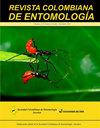Aspectos morfo-fisiológicos del tracto digestivo en larvas de IV estadio de Bradysia impatien (Diptera: Sciaridae)
IF 0.3
4区 农林科学
Q4 ENTOMOLOGY
引用次数: 0
Abstract
The morphological, cytological and physiological aspects of the digestive tract of the siarid Bradysia impatiens fourth-instar larvae were studied using bright-field microscopy. The division of the digestive tract into the stomodeum (foregut), the mesenteron (midgut) and the proctodeum (hindgut) was observed; the second of which being composed of endocrine, regenerative, column-shaped cells. The larvae did not present a crop; hence digestion of the bolus occurs in the midgut. They have two well-developed gastric caeca, where it can be assumed that great nutrient absorption takes place. The peritrophic membrane is type II, with a pore size that allows the passage of molecules up to 150 kDa, and which divides the midgut into two regions: the endoperitrophic and ectoperitrophic spaces. There are four Malpighian tubules present. The midgut has a pH gradient ranging from mildly alkaline in the foregut to neutral in the caeca and hindgut. It has a recirculation mechanism stretching from the endoperitrophic to the ectoperitrophic space and vice versa, which improves digestion and optimizes enzyme production. The morphophysiological features observed in B. impatiens larvae confirm that these organisms are well-adapted detritivores. Additionally, the peritrophic membrane protects the midgut from pathogenic agents.采用明光显微镜对凤仙花四龄幼虫消化道的形态学、细胞学和生理学进行了研究。消化道分为口胃(前肠)、肠系膜(中肠)和直肠膜(后肠);第二种细胞由内分泌、再生、柱状细胞组成。幼虫不成虫;因此,大丸的消化发生在中肠。它们有两个发育良好的胃盲肠,可以认为那里有大量的营养吸收。周营养膜为II型,其孔径允许分子通过150kda,并将中肠分为两个区域:内营养区和外营养区。有四个马氏小管。中肠的pH值从前肠的轻度碱性到后肠和盲肠的中性。它具有从内营养空间到外营养空间的再循环机制,反之亦然,这改善了消化并优化了酶的产生。凤仙花幼虫的形态生理特征证实了凤仙花是适应性较好的食腐动物。此外,周围营养膜保护中肠免受病原体的侵害。
本文章由计算机程序翻译,如有差异,请以英文原文为准。
求助全文
约1分钟内获得全文
求助全文
来源期刊
CiteScore
0.90
自引率
0.00%
发文量
25
审稿时长
>12 weeks
期刊介绍:
The Revista Colombiana de Entomología (Rev. Colomb. Entomol.) is the official scientific publication of the Colombian Society of Entomology - SOCOLEN since april of 1975. The journal is published twice a year. Contributions include Original Research Papers, Reviews of Entomological Topics (under a request from the Editorial Board), Taxonomic Papers, Points of View, New Records, Scientific Notes, Book Reviews, and Obituaries. The Revista Colombiana de Entomología welcomes contributions from both national and international researchers, and from members or non-members of the Society. Paper acceptance will depend on the evaluation of national and international academic peers. Manuscripts submitted for publication may be written in Spanish or English.

 求助内容:
求助内容: 应助结果提醒方式:
应助结果提醒方式:


